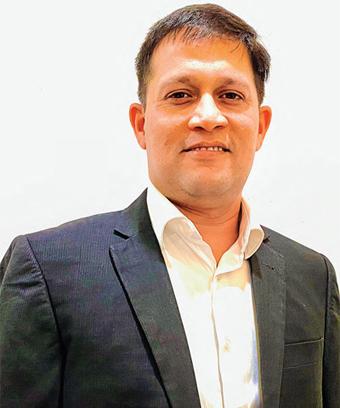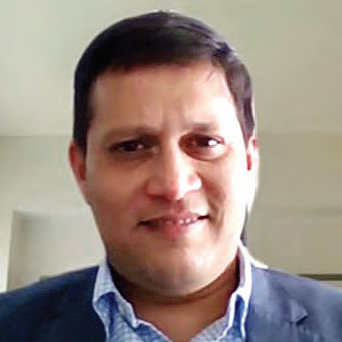CFO A Catalyst for Change

A global finance executive with extensive experience in corporate finance and recognised accomplishments within world-class global business environments, Mayank Khandelwal is Executive Vice President and Chief Financial Officer, NEC Corporation India Pvt Ltd, a subsidiary of NEC Corporation, Japan. With a strong financial management background and driving financial strategy through leadership, prior to joining NEC India, Mayank has held leadership roles with Udaan Express, General Electric, GE Healthcare Clinical Care Solutions. Mayank is a Chartered Accountant and holds a bachelor’s degree in commerce. He is also a graduate of esteemed GE Experience Finance leadership (EFLP). In an exclusive interview with Corporate Citizen, Mayank talks about his career journey so far in the corporate finance field, the role of CFO, finance leader’s top priority and much more
"Effective CFOs are proactive and drive a shared vision that orchestrates actions across the company. They step into the shoes of other leaders to see from their perspective while influencing their behaviours to coordinate priorities into a joint strategy"
- Mayank Khandelwal
Corporate Citizen: You have experience of over 16 years in corporate finance, playing different roles starting with AF Ferguson and for a long time in the leadership role as a CFO. Take us through your education and career journey till now.

Mayank Khandelwal: My business acumen and ability to go granular comes from my family’s background, which laid the foundation of my career. My interest in commerce led me to pursue a degree in Chartered Accountancy.
I started my career with AF Ferguson, one of India’s most respected and oldest audit firms, now a member firm with Deloitte. Before joining NEC, I have held various finance leadership roles with General Electric. My last role with GE was global head of GE Healthcare Supply Chain Financial Planning and Analysis and CFO Global Supply Chain Clinical Care Solutions based out of Health Care headquarters in the US.
Joining GE in 2010 was an inflection point in my career as I got a great opportunity to develop and grow both professionally and personally. As part of fast track leadership development, I was nominated for the prestigious Global Experienced Finance Leadership Program (EFLP) specially designed for identified high growth potential global finance leaders within GE. A two and a half year executive programme (together with your day job), focuses on elevating strategic, functional and technical leadership, which included on-premise training at GE leadership Academy in Crotonville and sessions at Harvard Business School.
After leaving GE and prior to joining NEC in June 2020, for a brief period I worked with Udaan Express, a leading B2B e-commerce company in India, as Finance Head/Chief Financial Officer.
At NEC, I took up the mantle to spearhead the diverse finance function of the technology behemoth in India last year. Since the beginning, my strategic focus has been to create a world-class financial management framework and streamline processes to enable various business units meet the aggressive expansion objective across government and enterprises segment. So far, it has been a rewarding journey working towards making societies safe and secure.
Over the last 16+ years of working across domestics and international markets has helped me develop strategic thinking and team management expertise across cultures and mindsets.
CC: How has the finance leader’s (CFO’s) role evolved over the years since you started?
The roles and responsibilities of finance leaders have changed in leaps and bounds since I began. Today, it is about driving business partnership, effective financial management, adapting to digital transformation and dealing with financial fallouts. CFOs are the change agents pushing critical agendas even outside the organisation.
Here are some of the essential elements of a CFO’s role in any organisation:
- Partner with CEO to drive organisation strategic vision and business plans
- Cultivate an innovation-driven mindset
- Develop and lead a fast, smart investment framework and related processes
- Create information and infrastructure for virtual collaboration
- Enable framework for real-time data visibility and actionable insights
- Create clear and measurable KPIs and tracking of the KPI’s to enable Business Units (BUs) focus on key and important parameters
- Drive profitability by cost rationalisation, pricing and profitability framework, and maximising the effectiveness of capital allocation
- Creating an agile, forward looking and decision-centric organisation
- Strengthen the culture of controllership, compliance and risk assessment framework
For the past decade, CFOs have played a pivotal role, balancing their traditional responsibilities with the new mandate. As part of management, focus is on creating business value and sustainable profitability. A CFO’s role is at the tipping point, particularly now as countries and corporations fight the pandemic’s second wave.
"CFOs need to lead from the front in guiding business the necessity of cash management and share continuous insights on the resources that will yield disproportionate value"

CC: Can you give us an overview of the industry you are in and NEC India’s growth strategy?
NEC is a global leader in integrating IT and network technologies with a legacy of more than 121 years. Empowering businesses with our cutting-edge products and solutions, at NEC India, we cater to the sectors like telecommunications, public safety, logistics, transportation, retail, finance, unified communication, and IT platforms, among others. Working with the Government in implementing life-changing projects is very rewarding, with the correct procedures and methodologies. Hence, one of our primary focus areas is to make our internal processes robust.
Leveraging our Global Development Centre’s (GDC) key capabilities across sectors, including telecom, manufacturing, logistics, etc. is one of our crucial growth drivers. We promote an ‘India Go Big’ initiative by leveraging our solution development and delivery capability from India to aid global business growth. The first 5G Open Radio Access Networks (ORAN) Laboratory in Chennai is a part of NEC’s ‘In India For India and From India For Global’ strategy. This India lab complements the operations of NEC’s Centre of Excellence in the UK. Our strong India team of 6000 members actively works with NEC’s team in Japan to leverage the knowledge and best practices across geographies.
CC: For any business, the primary objective is to earn a profit. How vital is CFO’s role in helping the company navigate the coronavirus crisis, especially the falling demand?
We are in the midst of this Fourth Industrial Revolution, where digital technologies have emerged as a critical driver for any company’s success. While an increasing number of companies embrace digital transformation, I think a CFO plays an essential role in highlighting the digital returns (of the right technologies) on investment (ROIs). Furthermore, an in-depth collaboration of IT and finance departments is necessary to ensure business continuity and devise relevant products/solutions to drive actual monetary gains for the company’s sustenance.
Talking from my example, as a strategic partner to the business units, I am responsible for enabling teams at NEC with tools, data, and processes to achieve the desired targets. I joined the company last year during the pandemic and, in a short interval, activated seamless collaboration among different business units and functions with meaningful endeavours. Banking on NEC’s rich brand legacy, we quickly started working towards providing solutions that are very specific to the needs of our customers in India as we moved into the changed circumstances.
We identified some 5-6 key growth drivers for NEC Corporation India as we implemented new solutions based on the ‘New Normal’ and made the customer adapt to the product better. We partnered with the Government to derive solutions based on the new models as our local presence in the Indian market is robust in terms of quality and cost expectations. For instance, to ensure faster check-ins and citizens’ safety, we have deployed biometric technology at some of the leading airports in India (Varanasi, Kolkata Pune, and Vijayawada). Besides the above four airports where we are currently deploying the system, we have done pilot projects for the solution at Hyderabad and Delhi Airport in the recent past. Additionally, we converted Gurugram Metropolitan Development Authority (GMDA) and Kalyan Dombivli Municipal Corporation (KDMC) into a smart war room to combat coronavirus spread. Our India story goes strong, and we continue to live by our purpose of making citizens’ everyday lives safe and secure.
CC: In such times of crisis, when cash shortage is a distinct possibility and conditions are changing constantly, what is a finance leader’s top priority as regards a company’s cash culture?
The importance of cash and preserving cash has increased manifold driven by changing macro and business atmosphere due to pandemic. CFOs need to lead from the front in guiding business the necessity of cash management and share continuous insights on the resources that will yield disproportionate value. Close collaboration between multiple teams to identify the relevant product, its pricing, and go-to-market strategy can lead CFOs to sustain the crisis.
CC: Does this crisis allow CFOs to perform a deep diagnostic on the balance sheet and find a new equilibrium?
Definitely! Considering the duration, severity, and related macroeconomic implications of the crisis, we can create a sensitivity around financial drivers and have counter measures in place. This requires you to go deep and understand business, financial levers and challenge the status quo. Technology tools come in handy here as CFOs can activate real-time monitoring and visibility around key financial metrics. With AI-powered financial trending and analytics, finance teams can provide real-time deep insights around the areas of improvement and leakages.
"While an increasing number of companies embrace digital transformation, a CFO plays an essential role in highlighting the digital returns (of the right technologies) on investment (ROIs)"
CC: It is said that crises are opportune times to restructure parts of the business that require transformation and the CFO’s role is well served to adopt a transformation mindset. Can you elaborate on the same?
As a CFO, you need to challenge yourself almost every day and ask if your company’s business model is fit for purpose today and, more important if it is fit for purpose for the future. Especially during crisis time and it’s not only about squeezing the budget to reduce costs. It’s about significantly changing the company’s processes and mode of operation. In many cases, you have to change the way you are structured, the go-to-market, the product portfolio and the mix and also includes the way your customers. And, in some cases, you have to exit specific areas of the business. CFOs are probably best positioned to challenge the businesses and drive the transformation.
CC: Nowadays, companies look for CFOs to have cross-functional leadership. Can you elaborate on the same?
A CFO plays a crucial role in driving change in an organisation other than just improving financial and operating performance. The role demands the professionals to influence the organisation’s core in the changing times as the gamut of functions that report into CFO have drastically increased. Effective CFOs are proactive and drive a shared vision that orchestrates actions across the company. They step into the shoes of other leaders to see from their perspective while influencing their behaviours to coordinate priorities into a joint strategy. It is the CFO’s job to ensure each function understands the actions required to achieve the vision, providing the line of sight to the end-state objective.
CC: What skills are necessary to elevate a finance person to a CFO role?
Aspiring CFOs should be result-oriented and should focus on building a solid track record of partnering with stakeholders to deliver results, improve operations and shape the business strategy.
Here are some five key focus areas for anyone who wants to rise to a CFO position:
- Be agile, digitally savvy and respond quickly to a disruption
- Ability to keep various teams connected
- Creative ideation on driving a workplace culture of innovation and continuous improvement
- Take calculated risks with proper assessment and prior research
- Lead long term business sustenance with pre-planned goals in mind.
CC: Which industries are poised for faster recovery than others post-pandemic and where is India’s growth curve headed?
As compared to the time when the first Covid-19 wave hit the nation, India and the world have seen various developments happening among the industries to combat the spread of coronavirus. Technology helped businesses add a layer of resilience and devise renewed business continuity plans to withstand sudden disruption. Sectors including logistics, manufacturing, healthcare, aviation, amongst others, are leveraging digital innovation in emerging technologies, such as cloud, artificial intelligence (AI), analytics, and big data to deal with the sudden tailspin situation.
CC: How critical is digital acceleration for India’s growth going forward?
Digital acceleration will be critical for India’s growth going forward. The government’s focus on an increased budgetary allocation towards digital infrastructure, technology up-gradation, digital governance, and automation is certainly going to accelerate this. In addition, an increased effort towards enhancing skills in new-age technologies like 5G, AI, Big Data, blockchain, and advanced manufacturing to sustain and improve India’s global competitiveness is the need of the hour.
CC: What are the expectations of global investors from the Indian market?
From an investment perspective, the emphasis and focus Japan has for India is massive. NEC Corporation India has good support from the global team and India is looking for opportunities to grow. That’s why our products in India address local needs and solutions for smart city initiatives, 5G, citizen services, infrastructure, transportation and logistics etc.